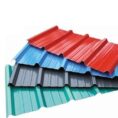Building Nigeria, Brick by Click: How an E-commerce Marketplace for Building Materials Can Transform the Sector

Nigeria's building sector is a vital engine for economic growth, providing essential infrastructure and housing for a rapidly expanding population. However, the sector faces numerous challenges, including fragmented supply chains, lack of price transparency, difficulties in sourcing quality materials, and logistical hurdles, particularly in a diverse and geographically complex nation.
This is where the power of e-commerce can be a game-changer. An online marketplace specifically focused on building material supplies has the potential to revolutionise the way stakeholders in Nigeria's building sector operate, creating a more efficient, transparent, and accessible ecosystem.
Bridging the Accessibility Gap:
One of the most significant challenges in the Nigerian building sector is the difficulty in accessing a wide range of quality building materials, especially in more remote areas. An e-commerce platform can overcome geographical limitations, connecting suppliers and buyers across the country. Architects, contractors, developers, and individual homeowners in Lagos, Kano, Port Harcourt, and beyond can easily browse, compare, and order materials from a diverse pool of verified vendors, all from the convenience of their computers or mobile devices.
This increased accessibility empowers builders in underserved regions, reduces the time and cost associated with sourcing materials, and fosters greater competition within the market.
Fostering Price Transparency and Affordability:
The current building materials market in Nigeria often lacks price transparency, making it difficult for buyers to make informed decisions and potentially leading to inflated costs. An e-commerce marketplace can address this by providing a platform where prices are clearly displayed and easily comparable across different suppliers.
This increased transparency empowers buyers to negotiate better deals, promotes fair pricing practices, and can ultimately contribute to more affordable construction projects, making housing and infrastructure development more accessible for Nigerians.
Streamlining Logistics and Improving Efficiency:
Logistics can be a significant bottleneck in Nigeria's building sector, with challenges related to transportation, warehousing, and timely delivery, especially given the country's infrastructure. An e-commerce marketplace can integrate logistics solutions, connecting buyers with reliable transportation providers and potentially offering warehousing options in strategic locations like Lagos and Abuja.
This streamlining of the supply chain can significantly improve efficiency, reduce project delays, and lower overall construction costs. Real-time tracking and communication features, tailored to the Nigerian context, can further enhance the logistics process, providing greater visibility and control for buyers and sellers.
Ensuring Quality and Standardization:
Concerns about the quality of building materials are prevalent in Nigeria. An e-commerce marketplace can play a crucial role in promoting quality and standardization by implementing strict vendor verification processes and encouraging product certifications from recognized bodies like the Standards Organisation of Nigeria (SON). Customer reviews and ratings can further enhance transparency and accountability, allowing buyers to make informed decisions based on the experiences of others.
By providing a platform for reputable suppliers and facilitating quality control measures, the marketplace can help to reduce the prevalence of substandard materials, leading to safer and more durable buildings across Nigeria.
Empowering Growth and Innovation:
By addressing key challenges related to accessibility, transparency, affordability, and efficiency, an e-commerce marketplace for building materials can be a powerful catalyst for growth and innovation in Nigeria's building sector. It can empower small and medium-sized enterprises (SMEs) by providing them with a wider market reach across Nigeria, foster collaboration among industry stakeholders, and drive the adoption of new technologies and best practices relevant to the local market.
In conclusion, an e-commerce marketplace focused on building material supplies holds immense potential to transform Nigeria's building sector. By leveraging the power of the internet and understanding the specific needs and challenges of the Nigerian market, this innovative approach can create a more efficient, transparent, and accessible ecosystem, ultimately contributing to the development of better infrastructure, more affordable housing, and sustained economic growth across the nation.




























